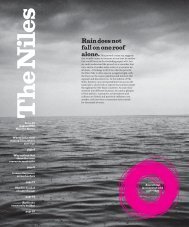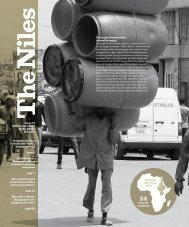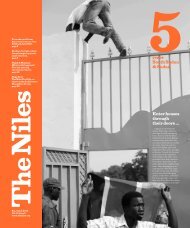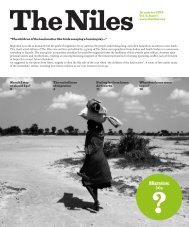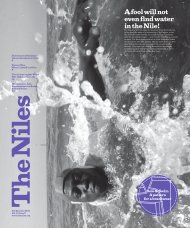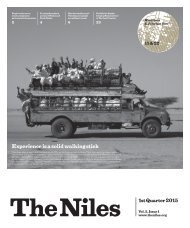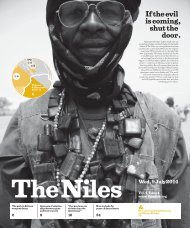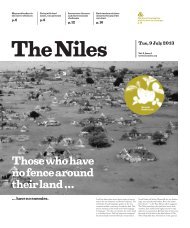When deeds speak, words are nothing
Speaking about sustainable development is easy. Acting sustainably is another matter. And now the evidence is unequivocal: Mankind’s impact on nature is causing the climate to change rapidly and drastically, threatening the environment and the very resources we need to survive. Aware that humanity is careening close to the edge, The Niles correspondents set out to explore where and how people in the Nile Basin region rethink. So much of their findings for now: We are an endlessly innovative species. Cooperation is our superpower. When deeds speak, words are nothing.
Speaking about sustainable development is easy. Acting sustainably is another matter. And now the evidence is unequivocal: Mankind’s impact on nature is causing the climate to change rapidly and drastically, threatening the environment and the very resources we need to survive. Aware that humanity is careening close to the edge, The Niles correspondents set out to explore where and how people in the Nile Basin region rethink. So much of their findings for now: We are an endlessly innovative species. Cooperation is our superpower. When deeds speak, words are nothing.
Create successful ePaper yourself
Turn your PDF publications into a flip-book with our unique Google optimized e-Paper software.
“Working with local leaders, the media,
cultural leaders and the technical people in all
the six districts that share river Mpanga, we
have engaged the different stakeholders along
the river and sensitised them on the importance
of protecting the catchment of the river,” says
Rwabuhinja. “Working with NGOs like the
Dutch-based SNV, we have planted trees along
the banks of the river to firm it and stop erosion.”
He added that they supported people to turn
to fish farming as an alternative income from
generating activity to replace sand mining.
But Baguma says the committee’s efforts are
not yet being felt on the ground. “Enforcement
of the rules governing the river remains very
weak. Sometimes they are violated by the very
people who are supposed to enforce the rules,”
he says. “Lack of awareness, especially among
the farmers, is a major challenge. People don’t
know the dangers of cultivating on river banks.”
Climate change impact
Less acknowledged perhaps by many in
the area is the contribution of climate change,
whose devastating impact has already been
documented in nearby districts like Kasese.
According to Stephen Ogwete, a Director
in the Ministry of Water and Environment,
the Rwenzori mountain ranges face the impact
of climate change.
Using the frequency of flooding events recorded
since the 1910s, Ogwete said the Nyamwamba,
one of the big rivers that start from the snowpeaked
Rwenzoris, has been experiencing
annual flooding for the past six years.
“Climate change is a relatively new phenomenon.
The first major flooding event on the
Nyamwamba River happened in the 1910s.
The next flooding event was in the 1950s.
As we moved, the frequency increased. Since
2014 to date, the river has experienced many
flooding events that left people dead and lots
of property destroyed,” says Ogwete.
The timing of the Nyamwamba River
flooding is around April and May, and the
highest water levels in the Mpanga River perhaps
suggest a link to a common cause since
both rivers start in the same mountain ranges.
Ogwete explains that due to high temperatures,
snow on the peak of the Rwenzoris melts
and combines with heavy rains that have been
experienced in recent years. These twin impacts
have resulted in floods during a short spell but
more prolonged episodes of reduced river flow
for the greater part of the year.
As temperatures rise, the snow in the
Rwenzori mountains melts faster, releasing
a tremendous amount of water, especially
around May every year, he explains. The river’s
flow is significantly increased by the rains that
come around the same time, resulting in floods.
Population pressure
The rising population in the area, fanned
by the influx of Congolese refugees, is another
pressure point for the river.
As Baguma observes, the increase in the
number of refugees in areas like Rwengoma
has added to the pressure for firewood, house
construction materials, land for cultivation,
all of which are putting pressure on the catchment
of the Mpanga River.
The Nile Basin, in general, is experiencing
one of the fastest population growth rates in
the world. According to the World Population
Prospect (UN 2013), the Nile Basin population
is likely to almost double by 2050, with the most
significant increases happening in urban areas.
As more people move into urban areas,
the demand for water, food, and construction
materials will grow exponentially.
Studies indicate that if nothing is done to
find more efficient ways of producing food, for
example, by 2050, the population of the Nile
Basin will require 1.5 times the amount of water
currently available in the basin.
Cooperation among member countries of
the Nile Basin is urgently needed. For example,
for the catchment management of rivers, joint
investment projects geared towards generating
“Collectively
engaging
all the
stakeholders.”
hydropower or to replace biomass as the
source of cooking energy.
Ogwete attests to the need for community
engagement in addressing such pressing
issues. “We realised that the only way we could
address the challenge of degradation is by
collectively engaging all the stakeholders
through their representatives,” he says.
Rethinking collaboration
The challenges facing the community that
depend on the Mpanga River are certainly not
unique to this part of the world where climate
change, rapid population growth and demands
imposed by growing economies push natural
resources to the brink.
The crisis faced by the community around
the Mpanga River illustrates the difficult
conundrum that afflicts people when they
choose to compete rather than cooperate over
water resources.
So far, steps taken include establishing
a broad-based community-focused river catchment
management committee, indicating that
people have realised that cooperation over water
resources is a transboundary matter and the
responsibility of all.
Left:
The Mpanga riverbed, altered
by human activity.
Photo: The Niles / Henry
Lutaaya
Right:
The water from an inlet
to the Mpanga River.
Photo: The Niles / Henry
Lutaaya
27









